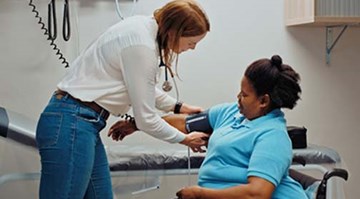How’s your heart? February is American Heart Month. This is a great time to check your heart health and learn more about heart disease.
According to the Centers for Disease Control (CDC), heart disease is the leading cause of death for Americans. Heart disease includes several different heart conditions. The most common one in the U.S. is coronary artery disease (CAD).
The CDC has more information about heart disease, but here are the basics to help you get started.
An Introduction to Heart Disease
Coronary artery disease affects blood flow to the heart. A decrease in blood flow can cause heart attacks. Signs of heart diseases may be “silent,” meaning the disease isn’t seen until a symptom arises. “Silent” symptoms of heart disease include:
- Heart attacks – chest or upper body pain; upper back and neck pain; indigestion; nausea or vomiting; dizziness; shortness of breath; extreme fatigue
- Arrhythmia – fluttering feelings (palpitations) in the chest
- Heart failure – fatigue; shortness of breath; swollen feet, ankles, legs, abdomen or neck veins
Knowing Your Risk
How much do you know about your family’s history with heart disease? If you’re not sure, it might be a good idea to talk with your doctor. There are other risk factors for heart disease besides genetics, though. The following conditions and behaviors increase your risk of developing heart disease:
- High blood pressure
- High cholesterol
- Diabetes
- Obesity
- Smoking
- Excessive alcohol use
- Physical inactivity
- Unhealthy diet
Heart Disease Prevention
The CDC recommends two main ways to prevent heart disease: choosing healthy habits and taking charge of your medical conditions. Choosing healthy habits looks like choosing healthy food, limiting your alcohol intake, keeping a healthy weight, getting regular physical activity and avoiding or quitting smoking. Taking charge of your medical conditions includes checking your cholesterol, controlling your blood pressure, managing your diabetes, taking medicines as directed and working with a health care team.
The CDC has resources for health professionals and a heart disease communications kit to ensure that your family, friends and community are educated about heart disease, too.






